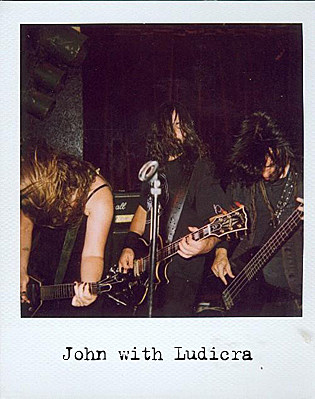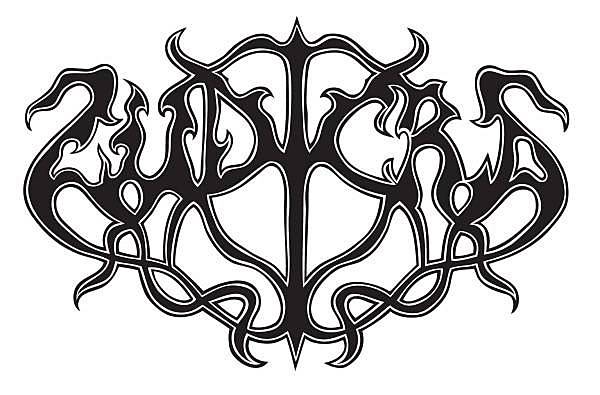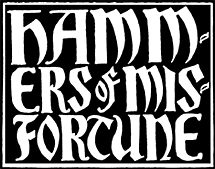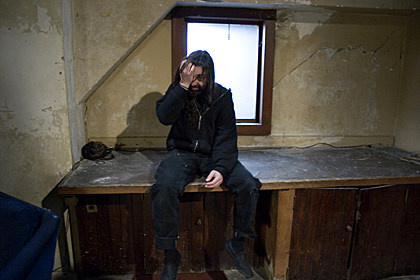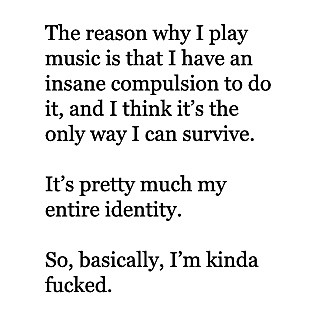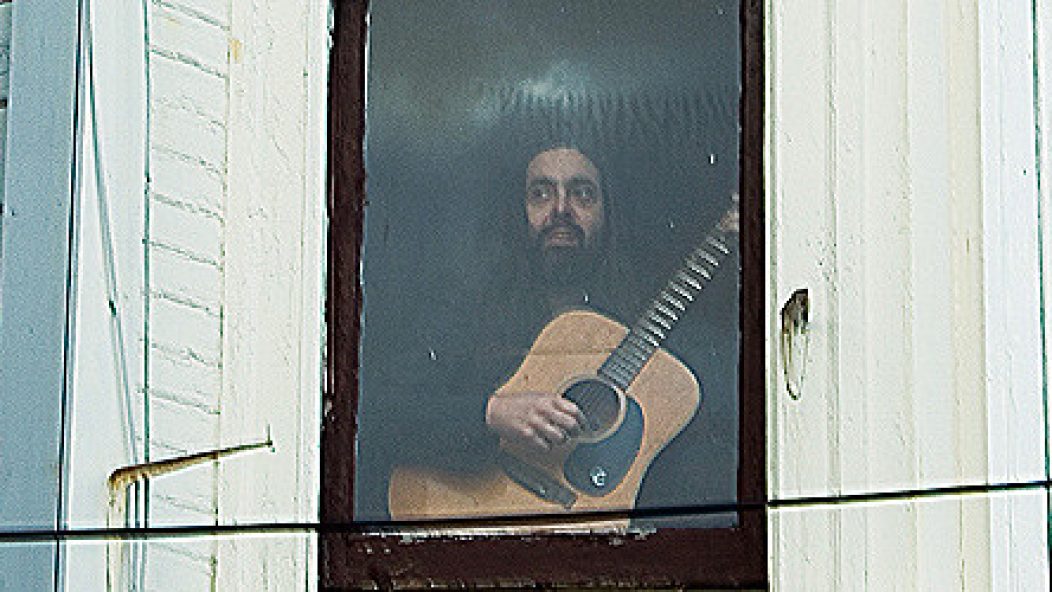
Interview: John Cobbett (Ludicra, Hammers of Misfortune)
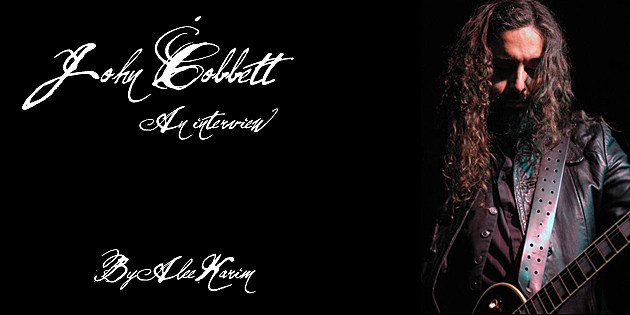
Earlier this year Ludicra‘s The Tenant blew me away with its relevance, its energy, and its RIFFS. Thoughtful lyrics narrate an anachronistic struggle with urban coldness against a backdrop of hybrid metal moments that schools Nachtmystium’s latest (if we’re talking about this year in USBM, that is). As time passed, it proceeded to do that all-too-rare thing for contemporary albums: merit and reward repeated listens with its depth and complexity. I predicted it would stay with me, and it has. The Tenant is a modern classic. As such, I recently hunted down guitarist/composer John Cobbett (also of SF supergroup Hammers of Misfortune) to talk about his compositional process, life in San Francisco, and the state of modern music – all of which he had PLENTY to say about. His Hammers bandmates, Leila Abdul-Rauf (also of Amber Asylum and Vastum) and Sigrid Sheie (Amber Asylum) joined us for a three-hour, ale-fueled conversation at the Elbo Room in SF.
. . .
Each of you are in multiple bands, correct?
SIGRID: Leila and I are both in Amber Asylum
JOHN: Leila is in 3 bands, Sigrid and I are in two bands each.
I was just wondering if there was any kind of scheduling lockdown, like “It’s Hammers time” or “It’s Ludicra time.”
JOHN: Ludicra practices on Tuesday nights. Hammers practices on Thursday nights and sometimes Wednesdays nights. I don’t know when Amber Asylum practices because I’m not in it [laughs].
So is Amber Asylum an occasion-only band?
SIGRID: It’s hard to say. We’ll definitely practice when we have a gig coming up. But Amber Asylum is going to Europe, and I won’t be with them because I have to work. Leila will be with them, though. So it’s very flexible in that band.
JOHN: And there’s two different kinds of rehearsals. There’s rehearsal to record, and there’s rehearsal to play a gig or tour. Rehearsal to play live means that everybody who’s gonna be on that stage has to be there. Rehearsal to record means that it can be just Sigrid and I working on guitar and keyboard parts, or Chewy and I are gonna get together to work on drum parts. Tonight we [Hammers] were practicing to figure out new material, which is my favorite thing to do in the whole world [laughs]. To WRITE music. As far as playing live, it’s OK. What I like, though, is the creative part: writing. That’s why I’m taking a break right now from playing any live shows.
Really?
Yeah. I’ve been waiting for this a long time [laughs]. I just want to write.
. . .
. . .
In a broader sense, I wanted to ask you what it’s like being a musician in this day and age where the standard goals of being a musician are very fractured at best and even non-existent to some extent. So people are defining their own goals now more than ever.
JOHN: Frankly, I don’t know why people play music these days. Sigrid, for example, went to school, got a master’s degree in music, and now she teaches music for a living.
SIGRID: I actually make a living off music.
JOHN: She has private students, she teaches at the Community Music Center (in SF Mission District) and the USF campus. She actually does music for a living – classical music.
SIGRID: I’m a professor now!
Oh, fuck! Congratulations!
JOHN: That’s the only way to make a living in music that I know of.
Or be John Mayer.
JOHN: Well, what are the chances that you’re going to be John Mayer? They’re one in a billion. Everybody and their mother believes in that myth that there’s money, and there’s drugs, and there’s girls, and there’s roadies. No! None of that is true. If you form a band tomorrow, chances are 999 out of 1000 that no one will ever give a shit about your fucking band. [laughs] How many people want to start a band? Then how many people actually go out and get it done? Maybe 1 out of 100. And once they do get it done, how many of those bands are actually fucking good? Maybe 1 in 100. How many of those bands can get more than 15 people to come to their show? Maybe 1 in 100. How many of those bands last more than two years? 1 in 1000. So the success rate for a band like Ludicra who can play locally and anywhere from 80 to 100 people will show up – that’s extraordinary. For us to have been together with the same lineup for 10 years – that is really, really rare. That never happens. [Music]’s a fool’s errand.
. . .
. . .
Would you say that the goals of Hammers and Ludicra have been surpassed at this point, in as far as their are set goals for either? Do you deem them successful projects?
I wouldn’t say they’ve been surpassed. The reason why I play music is that I have an insane compulsion to do it, and I think it’s the only I way I can survive. It’s pretty much my entire identity. So, basically, I’m kinda fucked. I’ve tried to go to school to learn to do other things, things that actually pay, and every single time I’ve tried to go to school, the music’s pulled me back, whether it’s time to record to an album or time to go on tour.
The last time I went back to school, I was going to study math, and then start tutoring math. Then Metal Blade calls on the phone saying, “We want to sign Hammers”. Then Ludicra’s going, “Oh, we’re gonna tour with Mayhem”. I was talking to a friend about how these kinds of opportunities don’t come every day, [whereas] school will always be there. So lo and behold, I’m quitting school and going on fucking tour. It happens every time I try to do something that pays an actual living wage.
Even at the level of Hammers of Misfortune or Ludicra, you make nothing. You pay way more than it yields. So when you say success, in the context of an underground metal band, or even an overground metal band, what you’re talking about is breaking even, and that’s it. There are no roadies, there are no groupies, there are no free drugs. So, kids: don’t do it! [laughs] There’s nothing wrong with being an engineer, there’s nothing wrong with being an accountant.
You know Kowloon Walled City?
Yes.
I was talking with Scott [Evans, guitar/vocals] and his attitude is similar to yours in that he accepts that he won’t reach the layperson’s ideal of success in music (which is all the things you talked about in terms of groupies, roadies, etc.) So instead you figure out what you really enjoy about making music, focus on that, and don’t worry about striving in that unrealistic way.
If you’re gonna make it big…first of all, there is no big anymore. Make it where? For me, the drive will always be that creative process, just that irrational impulse to write songs and make albums that I cannot control. If I had a rational thought process, I wouldn’t be doing this. [pause] I can’t explain it any better than that.
Sigrid and I were joking about this thing I think we saw in Chunklet or something about a government program that pays rock bands to quit. [laughs] Like, if we give you $10,000, will you stop making music for the rest of your life? Then if you will not accept that, we’ll offer you $20,000. I think it goes up to $1,000,000! [laughs] If you won’t stop when you’re offered $1,000,000 to play music, then you get to keep playing music. If you have the ability, if you’re mentally capable of not doing it, don’t do it. The people that continue to do music are the people that can’t NOT do it.
Let’s say you play a gig. You get 200 people paid through the door, buying drinks – and that’s basically what you’re doing, you’re an alcohol salesman – you’ll make about $500. That’s the best you can get, unless you wanna be Mastodon spending eight months out of a year living out of a van like a bum. No privacy, no control of your life, you just play on stage every night, and you try not to drink yourself to death.
I knew a guy who played in a band he hated. He was a hired gun. He got paid $55,000 a year to tour with this band that he hated.
Can you name the band?
No, I’m not gonna name the band. He’s like, “Their music fucking sucks, their fans are assholes”. [laughs] The guys in the band are OK, but eight months out of the year you do this. Do you get to have a girlfriend? Do you get to have an inner life, a creative, full life? Do you get to grow a garden? No.
Yeah, $55,000…I mean, teachers make that.
SIGRID: I don’t make that! [laughs]
Fair enough!
But I do make a living. And one that doesn’t eat up my life.
. . .
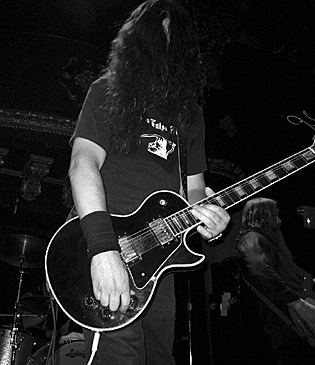
. . .
I saw Megadeth perform the other night [at American Carnage, see writeup here] and I was watching Chris Broderick, their new guitarist, whose job it is to recreate Marty Friedman’s solos. He plays them note for note.
JOHN: That’s his job.
Well, exactly. But I was wondering, what’s that worth to Dave Mustaine? What’s Broderick’s paycheck? And how does he weigh that against having no creative input?
SIGRID: Lawyers probably decided that. [laughs]
Right! And maybe he’s not a creative musician. Maybe he’s a technician, and it’s not a problem for him.
SIGRID: I’m totally just a performer. I’m not a writer.
JOHN: When you’re playing live, you have to play the same thing every night, anyway. So there’s nothing creative about it. If you’re in a jam band, every night you’re improvising. Whereas if you’re in metal, you’re playing the same thing every night.
In terms of Hammers’ music, I was wondering if the compositional process is collaborative, or if it all comes from you.
I’ll come up with ideas for songs. Usually I’ll start with a title, but there has to be some sort of an idea, i.e., this song is about something. And there’s always piles of riffs around. A lot of times I’ll try to write a song that’s not in my comfort zone. Like I’ll try to write a folk song, a real lyrics-based song with simple chords, and try to arrange that for metal ensemble. Other times I come in with a pile of riffs, and it’s just a matter of arranging them.
I try to come in to rehearsal with about 80% of the song complete. That’s so when we get to rehearsal, and people are looking at me like, “Uhhh, what are we doing next?” I like to have answers to those questions. Almost always, I’ll demo out a song with all the parts and send MP3s to everyone via email. Then we practice it, and it always sounds totally fucking different.
. . .
. . .
Is that how Ludicra operates as well?
Ludicra’s much different. Ludicra is like “go to practice and someone has a riff and everyone starts working on it”. Much more traditional metal working method. I’ll have a riff, and about eight out of 10 times, the band will say, “That riff sucks”.
Really?
Yeah, that’s why I’ll go in to those rehearsals with multiple riffs. That way something’s bound to stick.
You guys are all cool enough with each other to say something sucks and have no hard feelings about it?
People gladly tell me my riffs suck because they know I have a bunch more. [laughs]
[conversation ensues about gentrification of San Francisco’s Mission District… now we start talking about Sam McPheeter’s “Closed Frontier” article in Vice magazine]
Thanks for sharing that article, by the way. It’s such a well-written and well-researched piece. The whole Wild West metaphor is a really thoughtful and appropriate one in terms of the current musical climate.
Back in the ’80s, there was like this revelation with punk rock where it was like anyone can do it. Pick up a guitar, bash out three chords, and you can be The Ramones. That lasted for, like, two fucking years. [laughs] After that, it was like everyone and their brother could start a band.
It’s like tattoos. When I was a child, three types of people in the world had tattoos: prisoners, sailors, and bikers. Nobody else had tattoos. They were a mark. Normal people didn’t get tattoos. When you saw someone with a tattoo, you’d think, wow…
…this guy has a story.
Exactly: there must be a story there. Now, it’s like an earring or a handbag. 13 year-olds walk around the mall with tattoos. It signifies nothing. It’s a way to look like you have life experience.
When I got into metal, it was a very long time ago, like the early ’80s.
How old are you now?
I’m 44. So I was there, I saw Slayer in a room the size of this fucking booth. [laughs] Me and five other friends were the only people there. The opening band was this band called The Obsessed.
Oh, man!
Which featured a guy named Scott Weinrich before he became “Wino”. I saw Megadeth in Richmond, Virginia with about three other people. This was on the Peace Sells… Tour. Metal was so politically incorrect back then. I remember they got their tires slashed during the gig. People associated metal with sexism…
SIGRID: Homophobia!
JOHN:…ignorance. I think that’s because the people who created indie rock and alternative rock all got beat up in high school by people wearing Van Halen t-shirts. And they figured metal is for idiots. This continues to this day, though nowhere near as bad as in the ’90s.
I was gonna say, that attitude seems to be breaking down.
In the ’90s there was a bubble in the music industry that we used to refer to as “false metal”. Nowadays, we refer to it as “butt rock” or “hair metal”. That blew the fuck up. A whole shitload of bands were basically playing bubblegum pop with distorted guitars.
. . .
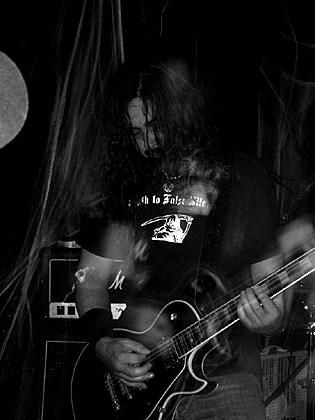
. . .
Define false metal for me.
False metal is metal that’s made to order, made to sell records. Look, I know there’s a place for party rock. I’ll go on record as saying Mötley Crüe’s first two albums are some of my favorite music. For me, they never fell into that false metal thing. The whole glitter/glam movement like Suzi Quatro, Bowie, Roxy Music, I love that stuff. It’s not about being brutal or anything, it’s just really good rock and roll. With Mötley Crüe, they were following in the footsteps of The Sweet and early Van Halen. Those bands are actually a big influence on Hammers.
Wait, so you haven’t explained yet: who is false metal?
The thing is that this isn’t a phenomenon that came from bands themselves, it’s generated by the media. Every article that I’ve read in local alt-weeklies about one of my bands starts with the writer talking about spandex and hairspray. This is endlessly frustrating to me, because that’s not what metal is about. It’s a media creation. It’s the industry that called Poison “metal”. Poison never called THEMSELVES “metal”. That perception is also why you get people going, “Yeah, metal, ‘WOOOAAAH!!!'” [puts up devil horns and laughs]
In the late ’80s and into the ’90s, metal was a dirty word. It was until the mid-’90s that I could actually get people to play metal with me.
Really?
Yeah. Metal was the most uncool fucking thing. I would be hanging out with girls, and they’d see my record collection and they’d go, “Really? Morbid Angel? What’s wrong with you? I thought you were a smart guy”.
So you’re saying that the qualities ascribed to bands like Poison became qualities ascribed to all metal?
Look, you’re running around with a blond poodle on your head, a sequined codpiece, and leather chaps, of course that’s gonna get the most attention. There were bands like Coroner around at the time who were brilliant, but no one’s gonna pay attention to that. That’s not on the radio. People are only gonna notice the brightest, flashiest color.
So that bias [that emerged from the popular bands of that era] still sticks with a lot of people over 30. They still think metal is for ignoramuses and jocks. But there’s a younger generation that doesn’t [have that preconception]. There’s a younger branch of “smarty-pants metal”. Personally, I’ve always felt that metal was brilliant. It was my own world. Morbid Angel and bands like that meant a lot to me, because that was like the sound of my own mind, working out my thoughts and processes. I also got a lot of support and meaning from those lyrics. There’s a sense of sadness and of trying to work things out – a lot more than just evil, Satan, etc.
I always felt like David Vincent’s lyrics were just about the struggle of the self which at different points means getting mired in shit or rising above it.
You look at Altars of Madness or Left Hand Path by Entombed, [and] you hear a struggle for some sort of redemption. This is the pathos that I always found in metal. I never understood why people laughed at that. Then I realized it was the metal bubble – the sequined codpieces, the poodleheads – that’s what was getting their attention. If you were metal, people would think of THAT, and you would get laughed at.
And if you were punk rock in the early ’80s – like if you had a mohawk or wore a Dead Kennedys patch – you would be in serious trouble. People would come after you.
That’s so alien for me to think about living in San Francisco.
In those days, I was living in DC. I was a punk in the ’80s growing up on Minor Threat. I got to go to clubs and see Black Flag, The Exploited, Bad Brains, Discharge, GBH, and The Birthday Party. Later I got to see Metallica, Slayer, and Anthrax when they were still unknown. I watched Metallica open for Venom. They were still unknown!
But by the time I got to SF, thrash was already dying.
What? When was this?
Like ’87. Roughly around when Metallica started breaking, everyone in Bay Area thrash just jumped aboard the whole topical lyrics thing, the melodic thing. Everyone lost their edge. Testament – their first album was amazing. And then after that, they tried to get topical and add “The Ballad”. Exodus, same thing.
Yeah, Testament definitely fall prey to this drudge kind of thing in the middle half of their career.
I wouldn’t know. I just know that first album, The Legacy.
Really? In light of all this, it makes sense that you’ve never heard ISIS [something Cobbett had mentioned previously]. You’ve just been listening to this shit for so long.
Right now, I’m on a big thrash metal kick. I’m revisiting Discharge. I’ve always loved Coroner – listening to them too; Witchtrap; this band called Toxik; early Fates Warning, the first two albums only. Their first singer John Arch was amazing. He could sing these great melodies over really technical guitar playing.
I’m always looking for those really intangible elements. A band could have all those elements: they’re really heavy, they’ve got a great guitarist, a great drummer. But do they have that…you know…je ne sais quoi?
That sort of goes back to what I was saying. Kids out there now, probably some of your readers, weren’t around when metal was a dirty word. Now it just seems normal. It’s just accepted as good music.
. . .
. . .
Metal is probably more accepted now than it’s ever been. At the same time, there’s a very short attention span globally across listening audiences. And I feel like when something doesn’t deliver fast, we don’t have time for it. Someone posted something recently on IO wondering what happened to listening to an album you didn’t like multiple times until you felt like you got it. It’s rare to see people marinating in new music anymore. That’s actually one of the things that I liked about The Tenant was that even though I really enjoyed it right off the bat. I could hear that I was gonna be listening to it for a while.
That’s awesome. Thank you. The thing is Hammers and Ludicra…we have a problem. [laughs] We have this thing about making albums that are meant to be listened to like a journey from one end of the thing to the other.
I think a lot of contemporary bands play two-adjective metal, like “we play blackened death metal” or “we play melodic thrash” or “we play epic power.” I think the roots of the criticisms behind the last Hammers album were that it didn’t adhere to any two-adjective descriptors. We weren’t making songs that had everything on the album represented in the first 30 seconds of a song, and then every song over the next 56 minutes was going to be in the same vein. That’s what people expect a metal band to do, and I can’t do that. That’s fucking boring. What I like to do is create a landscape, to show you the woods, the hills, and then, “Look at that house, and what’s behind that door?” You have to wait until the next song to find out. And people fucking don’t like that shit. People were upset that there’s a folk song on there. Look at Deep Purple or Queen – the people who invented heavy metal. They wrote every song as its own world. Each one negotiated the greater whole of the album.
Part of the fun of listening to Black Sabbath is negotiating the “filler” tracks. You accept them because they’re just charming and effective as breathers.
The best example of that is Thin Lizzy. There’s gonna be blazing Celtic metal and then Phil Lynott is gonna sing a love song. [laughs] It’s so poetic. I mean, Thin Lizzy got me through a couple really hard breakups. Phil Lynott is the ultimate lyricist for the tough guy with the broken heart.
And that’s what so great about them is that every song is NOT one fast-paced metal song after another. Every song is its own world. And they put out one or two albums a year, so yeah, some of that was filler. But all bands have filler. What do you think it is when a band has an hour-long album, and they’re just riding on one riff. And I LIKE that.
I was listening to Burzum’s Filosofem, and there’s that song with just a simple two-note pattern and a double-kick on top of it and it’s just repeated over and over [“Jesus Tod”]. Beautiful song. I sat there and counted how many iterations of the riff he did before a change happened and I think it was 36 iterations. Hammers would be crucified for that. But repetition, I think, is an art itself. I think it probably works best in doom and black metal, not so much in thrash. Then you have these guys playing “transcendental black metal”. It’s like, yeah, I guess it’s transcendental after you play the riff a million times. [laughs]
I think I know who you’re talking about.
Oh, I love ’em. They’re great kids.
. . .
. . .
So, yeah, let’s say Ludicra or Hammers gets crucified for playing a riff 36 times…
It’s crucified in a teapot, really. Nobody ACTUALLY fucking cares. [laughs] Maybe 100 people care and god bless each and every one of their fucking hearts, seriously.
In 2003, I reformed Hammers after The August Engine finally got released after every label on the planet passed on it. I couldn’t give that album away. When The Locust Years came out, it started getting reviews. And I would read these reviews that referred to The August Engine as our “classic album”. Which blew me away! Like I said, I couldn’t give away that fucking album. No one gave a shit about it to the point where we just shelved it. So we gave up on it and I started writing songs for The Sims video game. I was getting paid $5000 a song. I would make songs in different genres, getting my friends to come in and play on songs.
That sounds awesome.
It was great. That was before major labels started supplying MP3-quality versions of their artists’ songs in games. I wrote 10 songs for them, and so they sent me a check for $50,000. I had been trying to get Wells Fargo to get me a credit card forever. I banked with them for years, and they would not give me one. So the day I got this check, I went home and drank a bunch of whiskey, smoked a bunch of cigarettes. I woke up and went to the bank in those same clothes, without showering, to go deposit that check. [laughs]
Nice! Just as a way of saying fuck you?
Exactly. Fuck those guys. They had to call the manager. The manager looked at the check, then looked at me. Then he called his manager. [laughs] She came over and was looking at me. They start whispering to each other. By the end of it, they go, “Mr. Cobbett, would you like our deluxe platinum checking account with no annual fee?” And I said, hell yes. The thing I learned that day is that rich people don’t have to pay for anything. They get shit for free. The poor on the other hand get raped. The rich rape the poor, and that’s a big part of what I’m writing about right now for the next Hammers album.
But ultimately, I know I’m lucky. We shouldn’t feel entitled to play music and talk about music. Just the fact that we have hot water on demand all the time is such a luxury! I consider myself very lucky to be a starving artist at this point in history. And I say “starving” in quotes because I mean, really, I’m not starving. [laughs]
. . .
